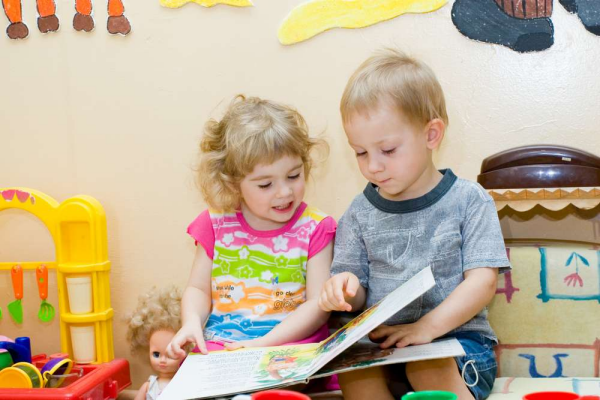- Most Preschoolers Will: Know the names of their favorite books; hold a book correctly and turn pages; recall familiar words and phrases in favorite books, pretend to read books; know the difference between a random squiggle and a letter or number.
- Some Preschoolers Will: Recognize and write some letters and numbers; name letters that begin certain words, make up rhymes or silly phrases.
- Some Preschoolers Might Even: Predict what might happen next in a story, read and write their names and some familiar words, retell stories that they know.
Literacy doesn’t start only when your child starts school. From birth, babies and children are gathering skills they’ll use in reading. The years between ages 3 and 5 are critical to reading growth, and some 5-year-olds are already in kindergarten.
The best way to instill a love for and interest in reading is to simply read to your child.And yet, many parents don’t. Reading gives you the opportunity for close bonding with your child, and it also provides a window into a world of literacy that your child is about to enter.
As your child goes from saying her first sentences to speaking in paragraphs, you will start to see exciting milestones develop with reading. Your child will begin to recognize print on the street, stop signs, familiar store signs, and the address posted on your home.
- Talk About Text
A text-rich environment for preschoolers lays the groundwork for reading success. It’s not just about having books in the home, although that’s a great start. You can also start talking about letters, numbers, and words on packages and signs.
Help your child see how text is already a part of his daily life. Point out the name of his favorite cereal. Show him the labels on clothing. Show him the different parts of a birthday card or invitation.
When you are out and about, play games involving letter and number recognition. Can your child tell you any of the letters in the supermarket sign? Can she read the serving amount on a packaged snack? She will be delighted to understand more about her world — but don’t push her delight. Developing text awareness should never be a chore.
- Be Aware of Problems
Are you concerned that your child might have a learning disability? As with almost any disability, early intervention can prevent problems in the future. In the preschool years, speech delays are much more noticeable than the learning disabilities that may affect a child’s efforts to read. Ask your pediatrician for advice if you are concerned that your child is speech delayed.
Most school districts will not diagnose reading disabilities until first grade. However, there are signs that you can look for earlier. If your 5-year-old can’t “hear” the rhyme in two simple words, or cannot differentiate between a letter and a random squiggle, this may be an area of development you’ll want to keep an eye on.


